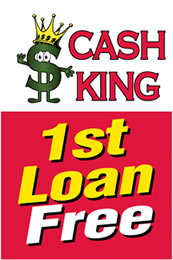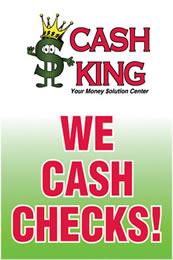About the Payday Loan Industry
Do Cash Advances have unreasonably high interest rates?
Unlike other financial services, payday loans charge a flat fee and do not have interest accruing fees. The typical fee for a payday loan is $15 per $100 borrowed — a set price for a short-term transaction. Our customers say they appreciate that a payday loan, with a onetime fee, can be less expensive than taking on the costs of bouncing a check, missing a credit card payment or neglecting a bill.
The Federal Truth in Lending Act (TILA) requires all financial institutions to disclose loan fees as Annual Percentage Rates (APR). In order to comply with TILA, Cash King reports the implied APR of a payday loan — the amount you would pay in fees if you renewed your advance every two weeks for a full year. However, the average loan term is only two to four weeks. APR is a more appropriate measure of costs associated with loans that last for at least a year, such as a mortgage loan or a car loan. However, even using APR as a measure of the cost of various options for short-term loans, payday loans are still the least costly option compared to bank overdraft, bounced check, late payment and utility reconnection fees.
Couldn’t Cash King still operate profitably if they charged a much smaller APR?
Some of our critics have proposed capping interest rates for payday loans/cash advances, but to do so would greatly impede our ability to operate. If we charged lower fees, we would not generate enough income to pay for basic business expenses, such as rent, utilities and wages. If we were to charge an APR of 36 percent, as some of our critics have suggested, that would mean customers pay a fee of $1.38 per $100 borrowed. No business — not a credit union, not a bank — can lend money for 10 cents a day for a two week loan term without being subsidized. Such rate cap models overlook the significant cost of operating a regulated business, and would be an effective ban on payday loans/cash advances. Our customers recognize that the price of the onetime fee is appropriate for a short-term loan, relative to other options.
Why can’t cash advance customers just go to a bank instead?
Most banks do not provide the kind of small dollar, short-term loans that our customers need. The average amount of a cash advance is about $350, an amount significantly lower than what a bank will loan. Some banks and credit unions have begun to offer products they promote as “alternatives” to cash advances, but these options are not broadly available and involve a variety of restrictions and complex fee structures. And in some cases, though our customers all have a bank or credit union account, they may choose not to obtain credit from these institutions because of a negative past experience, such as encountering hidden fees. We support a competitive market and encourage our customers to weigh all of their options before choosing our service. Cash advances are not for everyone, but our customers make informed decisions, and choose Cash King because they appreciate the simplicity, reliability and transparency of payday loans/cash advances.
Do cash advances trap customers in a never ending “cycle of debt?”
The “cycle of debt” catchphrase is our opponents’ attempt to portray our industry as taking advantage of people. Our stores and service representatives work to prevent this by making cash advances that match, but do not exceed, customer’s needs. It hurts the company, and the customer, when a loan is not repaid.
If a customer is unable to pay back an advance within the arranged timeframe, Cash King works with them to find the best way to deal with their individual situation and to repay the loan in full. For example, our locations offer an Extended Payment Plan, that allows customers a longer time period to repay at no additional charge. In fact, about 90 percent of our customers repay their advances when due and 95 percent are ultimately paid off.
Is it true that Cash Advance lenders prey on unsophisticated customers?
According to customer surveys, 92 percent of customers think cash advance lenders offer a valuable service and 90 percent are satisfied with their understanding of the terms and costs of cash advances. Cash King fully discloses the terms of the cash advance transaction.
Our customers are hardworking individuals — including teachers, nurses, bus drivers and first responders — who make a positive contribution to their community. All customers must have a steady source of income and a checking account to receive a cash advance.
Is the cash advance industry regulated?
Cash advances are highly regulated on the state and federal level to protect both our company and the consumer. Laws and regulations include:
State Regulations: The Cash Advance industry is highly regulated by state officials across the country. State laws typically limit the principal amount on an advance; set maximum fees; limit a customer’s ability to renew an advance; and require various disclosures. And, most states require that a customer have the right to rescind the transaction before the end of the next business day.
Federal Regulation: A number of federal laws and agencies regulate our business and help protect our customers, including the Consumer Financial Protection Bureau (CFPB).
Federal Truth in Lending Act (TILA): This law requires lenders to clearly define key terms of consumer lending agreements and fully disclose all associated fees and charges, ensuring that consumers are able to compare the costs of all credit options.
Fair Debt Collection Practices Act (FDCPA): Cash King only contracts with collection agencies that use legal, professional and nonaggressive collection practices.
Fair Credit Reporting Act (FCRA): We adhere to strict policies that regulate the collection, dissemination, and use of consumer information, including consumer credit information.
Equal Credit Opportunity Act (ECOA): We do not discriminate based on race, color, religion, national origin, sex, marital status, age, or because someone receives public assistance.
GrammLeach Bliley Act (GLB Act): The GLB Act is designed to protect consumers’ personal financial information held by financial institutions. This prohibits the sharing of personal information about customers.
John Warner National Defense Authorization Act limits the total charges on a small loan of 91 days or fewer to a 36 percent Military Annual Percentage Rate. As a result, we do not offer loans to military personnel.



